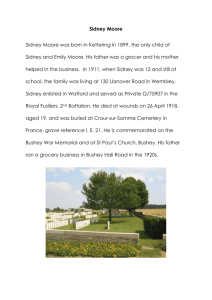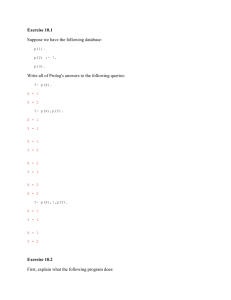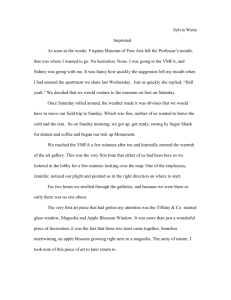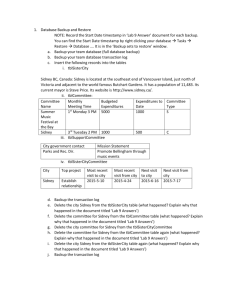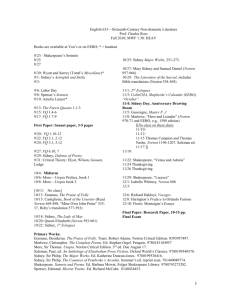CV - North-West University
advertisement
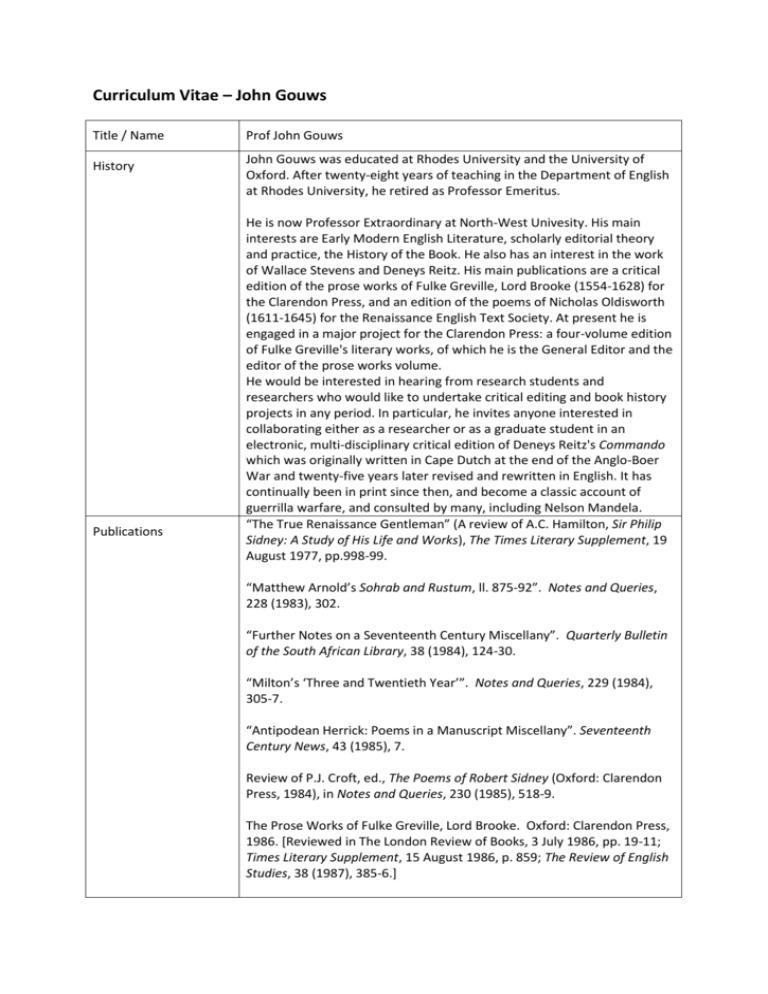
Curriculum Vitae – John Gouws Title / Name History Publications Prof John Gouws John Gouws was educated at Rhodes University and the University of Oxford. After twenty-eight years of teaching in the Department of English at Rhodes University, he retired as Professor Emeritus. He is now Professor Extraordinary at North-West Univesity. His main interests are Early Modern English Literature, scholarly editorial theory and practice, the History of the Book. He also has an interest in the work of Wallace Stevens and Deneys Reitz. His main publications are a critical edition of the prose works of Fulke Greville, Lord Brooke (1554-1628) for the Clarendon Press, and an edition of the poems of Nicholas Oldisworth (1611-1645) for the Renaissance English Text Society. At present he is engaged in a major project for the Clarendon Press: a four-volume edition of Fulke Greville's literary works, of which he is the General Editor and the editor of the prose works volume. He would be interested in hearing from research students and researchers who would like to undertake critical editing and book history projects in any period. In particular, he invites anyone interested in collaborating either as a researcher or as a graduate student in an electronic, multi-disciplinary critical edition of Deneys Reitz's Commando which was originally written in Cape Dutch at the end of the Anglo-Boer War and twenty-five years later revised and rewritten in English. It has continually been in print since then, and become a classic account of guerrilla warfare, and consulted by many, including Nelson Mandela. “The True Renaissance Gentleman” (A review of A.C. Hamilton, Sir Philip Sidney: A Study of His Life and Works), The Times Literary Supplement, 19 August 1977, pp.998-99. “Matthew Arnold’s Sohrab and Rustum, ll. 875-92”. Notes and Queries, 228 (1983), 302. “Further Notes on a Seventeenth Century Miscellany”. Quarterly Bulletin of the South African Library, 38 (1984), 124-30. “Milton’s ‘Three and Twentieth Year’”. Notes and Queries, 229 (1984), 305-7. “Antipodean Herrick: Poems in a Manuscript Miscellany”. Seventeenth Century News, 43 (1985), 7. Review of P.J. Croft, ed., The Poems of Robert Sidney (Oxford: Clarendon Press, 1984), in Notes and Queries, 230 (1985), 518-9. The Prose Works of Fulke Greville, Lord Brooke. Oxford: Clarendon Press, 1986. [Reviewed in The London Review of Books, 3 July 1986, pp. 19-11; Times Literary Supplement, 15 August 1986, p. 859; The Review of English Studies, 38 (1987), 385-6.] “Fact and Anecdote in Fulke Greville’s Account of Sidney’s Last Days”. Sir Philip Sidney: 1586 and the Creation of a Legend, ed. Jan van Dorsten et al. (Leiden: E.J. Brill / Leiden University Press, 1986), pp.62-82. Review of G. Hammond, ed., Sir Walter Ralegh: Selected Writings (Manchester: Carcanet, 1984), in Notes and Queries, 231 (1986), 410-ll. Review of Jonathan Crewe, Hidden Designs: The Critical Profession and Renaissance Literature (London: Methuen, 1986), in Notes and Queries, 233 (1988), 217-8. Review of Susanne Woods, Natural Emphasis: English Versification from Chaucer to Dryden (San Marino: The Huntington Library, 1984), in Sidney Newsletter, 8:1 (1987), 26-8. Review of Don E. Wayne, Penshurst: The Semiotics of Place and the Poetics of History (Madison: University of Wisconsin Press, 1984) in Sidney Newsletter, 8:1 (1987), 44-6. Review of M.G. Brennan, Literary Patronage in the English Renaissance: The Pembroke Family (London: Routledge, 1988), in Notes and Queries, 234 (1989), 499-500. “The Significance of the Nineteenth-century Development of the Sidney Legend”, in Sir Philip Sidney’s Achievements, (New York: AMS, 1990), ed. M.J.B. Allen et al., pp.252-60. Review of L.S. Marcus, Puzzling Shakespeare: Local Reading and Its Discontents. (The New Historicism: Studies in Cultural Poetics, vol. 6) Berkeley: University of California Press, 1988, in Notes and Queries, 235 (1990), 220-221. The Pursuit of Poetry: A Defence. Grahamstown: Rhodes University, 1990. [ISBN 0-86810-205-9] “Shakespeare, Webster and the Moriturus Lyric in Renaissance England”, Shakespeare in Southern Africa, 3 (1989), 45-57. “Foucault and Shakespeare’s Pedants, Dotards and Drunks”, Literator, 11.3 (1990), 29-41. Review of Edmund Spenser, The Yale Edition of the Shorter Poems, ed. W.A. Oram, et al. (New Haven and London: Yale University Press, 1989), in Notes and Queries, 235 (1990), 462-3. “Dressing Malvolio for the Part”, Notes and Queries, 236 (1991), 478-9. “Narrative Strategy and Sidney’s Astrophel and Stella”, The Southern African Journal for Medieval and Renaissance Studies, 2.1 (1991), 67-82. Review of Dennis Kay, Melodious Teares: The English Funeral Elegy from Spenser to Milton (Oxford: Clarendon Press, 1990), in Notes and Queries 236 (1991), 531-2. “The Pursuit of Poetry”, Crux, 26.1 (1992), 39-50. Review of Joan Rees, Sir Philip Sidney and “Arcadia” (Rutherford: Fairleigh Dickinson University Press, 1991), in Notes and Queries 237 (1992), 502. “Nicholas Oldisworth (1611-1645)”, English Academy Review, 9 (1992). “Nicholas Oldisworth and Bodleian MS Don.c.24”. Boldleian Library Record, 15.3 (1995),158-65. “Shut, shut the door, good John”: Alexander Pope and the Challenge of Exclusion”. UNISA English Studies, 33.1 (1995), 1-5. Review of Joseph H. Summers, Collected Essays on Renaissance Literature, George Herbert Journal, Special Studies and Monographs, 1993; and David Lee Miller, Sharon O”Dair and Harold Weber, eds., The Production of English Renaissance Culture (Ithaca and London: Cornell University Press, 1994). Notes and Queries, 241 (1996), 84-5. “Fulke Greville, First Lord Brooke” in Dictionary of Literary Biography: Vol. 172, Sixteenth-Century British Nondramatic Writers, ed. David A. Richardson. Detroit: Gale Research, 1996. Pp. 105-115 Review of David Johnson, Shakespeare and South Africa. (Oxford: Clarendon Press, 1966). Notes and Queries, 242 (1997), 554-5. Review of Raymond A. Anselment, The Realms of Apollo: Literature and Healing in Seventeenth-Century England (Newark: University of Delaware Press; London: Associated University Presses, 1995) and Jonathan Sawday, The Body Emblazoned:Dissection and the Human Body in Renaissance Culture (London and New York: Routledge, 1995). Notes and Queries, 242 (1997), 556-8. “Fulke Greville’s A Dedication to Sir Philip Sidney and the Protocols of Textual Scholarship”, English Manuscript Studies, 6 (1997), 114-39. “Shakespeare and the Self: Being true to Hamlet”, Shakespeare in Southern Africa, 9 (1996 [1998]), 32-40. Review of H.R. Woudhuysen, Sir Philip Sidney and the Circulation of Manuscripts, 1558-1640 (Oxford: Clarendon Press, 1996), in Renaissance Quarterly, LI (1998), 1031-33. Review of Blair Worden, The Sound of Virtue: Philip Sidney’s “Arcadia” and Elizabethan Politics (New Haven and London: Yale University Press, 1996) and Martin Garrett (ed.), Sidney: The Critical Heritage, The Critical Heritage Series (London and New York: Routledge, 1996), in Notes and Queries, 244 (1999), 111-13. Review of Lisa M Klein, The Examplary Sidney and the Elizabethan Sonneteer (Newark: University of Delaware Press and London: Associated University Presses, 1998), in Notes and Queries, 245 (2000): 233-34. Review of Tom W N Parker, Proportional Form in the Sonnets of the Sidney Circle: Loving in Truth (Oxford: Clarendon Press, 1998), in Notes and Queries, 245 (2000), 234-35. Review of Marcus Walsh, Shakespeare, Milton and Eighteenth-Century Literary Editing: The Beginnings of Interpretative Scholarship (Cambridge: Cambridge University Press, 1997), in Shakespeare Studies in Southern Africa, 11 (1998 [2000]), 59-61. Review of Michael Schoenfeldt, Bodies and Selves in Early Modern England: Physiology and Inwardness in Spenser, Shakespeare, Herbert and Milton (Cambridge, New York, Oakleigh: Cambridge University Press, 1999) in Notes and Queries, 246,2 (2001), 193. “Fulke Greville”, Oxford Dictionary of National Biography, Oxford, 2004. “Nicholas Oldisworth”, Oxford Dictionary of National Biography, Oxford, 2004. “Deneys Reitz and Imperial Co-option”, Books and Empire: Textual Production, Distribution and Consumption in Colonial and Postcolonial Countries, ed. Paul Eggert and Elizabeth Webby (Wellington: Bibliographical Society of Australia and New Zealand, 2004)[ISBN 09751500-1-4], 73-82. “Nicholas Oldisworth (1611-1645) and the Westminster School Poets”, Southern African Journal of Medieval and Renaissance Studies, 13 (2003)[2005], 57-70. “Nicholas Oldisworth and the complex, multilayered cultures of seventeenth century Gloucestershire”,Southern African Journal of Medieval and Renaissance Studies, 14(2004)[2006], 91-113. “Book and Text Studies in Grahamstown”, English Studies in Africa, 47.1 (2004), 119-24. “Sidney’s ‘Old’ Arcadia as Polymorphous Text: a Case Study of the Phillipps Manuscript”, TEXT: An Interdisciplinary Annual of Textual Studies, 17 (2005), 93–116. Review of Thomas Carper and Derek Attridge, Meter and Meaning: An Introduction to Rhythm in Poetry (New York and London: Routledge, 2003) in Notes and Queries, 250 (2005), 130-131. Review of Michael G Brennan and Noel J Kinnamon, A Sidney Chronology 1554-1564 (New York, Basingstoke, London: Palgrave Macmillan, 2003), and Elizabeth Mazzola, Favorite Sons: The Politics and Poetics of the Sidney Family (New York, Basingstoke, London: Palgrave Macmillan, 2003) in Notes and Queries, 250 (2005), 249-51. “Nicholas Oldisworth, Richard Bacon, and the Practices of Caroline Friendship” in Texas Studies in Literature and Language, 47 (2005), 366401. Review of Margaret P. Hannay, Noel J. Kinnamon and Michael Brennan, eds. Domestic Politics and Family Absence: The Correspondence (15991621) of Robert Sidney, First Earl of Leicester, and Barbara Gamage Sidney, Countess of Leicester. Aldershot and Burlington: Ashgate Publishing, 2005, in Notes and Queries, 54 (2007): 106-107. “Religious authority and poetic knowledge: the alternative of Nicholas Oldisworth's farewell to poetry”, Southern African Journal of Medieval and Renaissance Studies 17 (2007 [2009]): 41-55. “A Celebration of Book History in Africa”. English in Africa 35.1 (2008): 58 ‘Why “Text Happens” won’t do for Fulke Greville (or anyone else)’, Variants 6 (2007[2009]): 15-32. [Revised version of plenary address at ESTS conference, November 2006] Nicholas Oldisworth’s Manuscript (Bodleian MS. Don.c.24). Tempe, Arizona: ACMRS in conjunction with Renaissance English Text Society, 2009. “The Date of Milton's Sonnet VII”, accepted for publication by Notes and Queries 57 (2010): 39-41. “Nicholas Oldisworth and William Davenant: Moors and Slaves in Early Modern England”, Notes and Queries 57(2010):36-37. “A seventeenth-century Sidney allusion”, Notes and Queries 57(2010): 421-422. “The Cape Colony’s earliest subscription library” in New Word Order: Transnational Themes in Book History, ed. Swapan Chakravorty and Abhijit Gupta (New Delhi: Worldview, 2011: 127-136. "Narrative Strategies in Sir Philip Sidney's Astrophil and Stella," Literator 31.3 (2010): 61-78) "Wallace Stevens's Use of Narrative Markers in Harmonium," Literator 31.3 (2010): 161-180) "The Textual Trek of Deneys Reitz's Commando." Variants: Journal of the European Society for Textual Scholarship 9 (2012): 185-198. “Deneys Reitz and Imperial Co-option." In Print, Book and Text Cultures in South Africa. Ed. Andrew van der Vlies. Johannesburg: Witwatersrand University Press (2012): 110-120. Review of Matthew Woodcock, Sir Philip Sidney and the Sidney Circle. (Writers and Their Work). Northcote House Publishers Ltd, 2010). Notes and Queries, 59 (2012): 592-594. “An Early Sidney Allusion”. Notes and Queries 59 (2012): 524-525. "Editing 'a mute inglorious Milton' of Gloucestershire: Nicholas Oldisworth" in New Ways of Looking at Old Texts, V: Papers of the Renaissance English Text Society 2007-2011, ed. Michael Denbo. Tempe, Arizona: Arizona Center for Medieval and Renaissance Studies in conjunction with the Renaissance English Text Soceity. [Due for publication 2013] “Deneys Reitz and the Bounds of Self-Understanding” in Crossing Borders, Dissolving Boundaries, ed. Hein Viljoen (Amsterdam and New York: Rodopi, 2013): 51-74.
